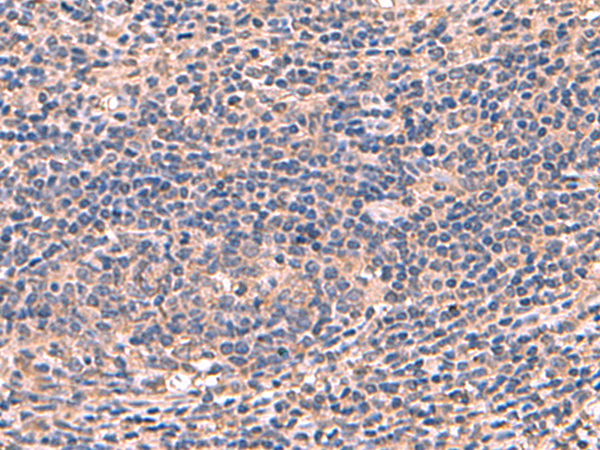
| WB | 咨询技术 | Human,Mouse,Rat |
| IF | 咨询技术 | Human,Mouse,Rat |
| IHC | 1/50-1/300 | Human,Mouse,Rat |
| ICC | 技术咨询 | Human,Mouse,Rat |
| FCM | 咨询技术 | Human,Mouse,Rat |
| Elisa | 1/5000-1/10000 | Human,Mouse,Rat |
| Aliases | DCAL; IRBIT; PPP1R78; PRO0233; XPVKONA |
| Host/Isotype | Rabbit IgG |
| Antibody Type | Primary antibody |
| Storage | Store at 4°C short term. Aliquot and store at -20°C long term. Avoid freeze/thaw cycles. |
| Species Reactivity | Human, Mouse, Rat |
| Immunogen | Fusion protein of human AHCYL1 |
| Formulation | Purified antibody in PBS with 0.05% sodium azide and 50% glycerol. |
+ +
以下是关于AHCYL1抗体的3篇参考文献及其简要摘要:
---
1. **"AHCYL1 regulates IRBIT-mediated calcium signaling and RNA metabolism"**
*Authors: Ohashi et al.*
摘要:研究AHCYL1通过调控IRBIT蛋白在细胞内钙信号传导中的作用,利用AHCYL1抗体进行免疫共沉淀实验,揭示其在RNA结合及代谢中的功能。
---
2. **"The role of AHCYL1 in innate immunity via IRAK1 ubiquitination"**
*Authors: Kim et al.*
摘要:通过AHCYL1抗体进行Western blot和免疫荧光分析,发现AHCYL1通过调控IRAK1泛素化影响TLR信号通路,进而参与先天免疫反应。
---
3. **"AHCYL1 interacts with the ORF1 protein of retrotransposons to regulate viral replication"**
*Authors: Li et al.*
摘要:利用AHCYL1抗体进行免疫沉淀和质谱分析,证明其与逆转录转座子ORF1蛋白相互作用,影响病毒复制和宿主基因组稳定性。
---
4. **"AHCYL1 modulates cell cycle progression by binding to 14-3-3 proteins"**
*Authors: Zhang et al.*
摘要:通过AHCYL1抗体检测其在细胞周期中的表达变化,发现其通过结合14-3-3蛋白调控G1/S期转换,影响细胞增殖与肿瘤发生。
---
这些文献均涉及AHCYL1抗体的实验应用,涵盖免疫沉淀、Western blot等功能研究。如需具体期刊信息或年份,可进一步补充关键词检索。
AHCYL1 (adenosylhomocysteinase-like 1) is a ubiquitously expressed protein initially identified due to its homology to S-adenosylhomocysteine hydrolase (AHCY), though it lacks enzymatic activity. It plays multifaceted roles in cellular processes, including calcium signaling, mRNA regulation, and nucleotide metabolism. AHCYL1 interacts with inositol 1.4.5-trisphosphate receptors (IP3Rs) through its binding partner IRBIT (IP3R-binding protein released with inositol 1.4.5-trisphosphate), modulating calcium release from the endoplasmic reticulum. It also participates in mRNA processing and stability by associating with RNA-binding proteins.
AHCYL1 antibodies are essential tools for studying its expression, localization, and interactions. They are widely used in techniques like Western blotting, immunoprecipitation (IP), and immunofluorescence (IF) to investigate its regulatory roles in physiological and pathological contexts. Commercially available antibodies are typically raised against specific epitopes, such as the N-terminal or C-terminal regions, with validation in knockout cell lines to ensure specificity. Polyclonal and monoclonal formats exist, derived from hosts like rabbits or mice. Researchers utilize these antibodies to explore AHCYL1's involvement in diseases, including cancer (e.g., colorectal, liver) and neurological disorders, where its dysregulation impacts cellular proliferation, apoptosis, or metabolic pathways. Proper antibody validation remains critical due to potential cross-reactivity with homologous proteins like AHCY.
×